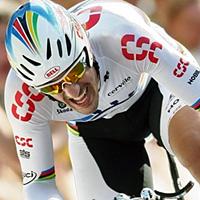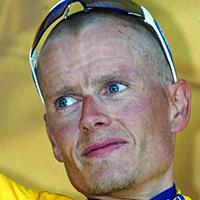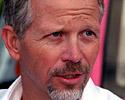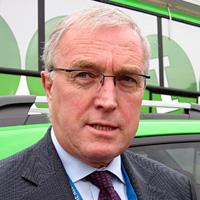Latest Edition Cycling News for July 21, 2007Edited by Laura Weislo The Tour's big test looms for hopefuls- can 'Chicken' dismiss the ghost of past TTs?By Paul Verkuylen
Today's individual time trial (stage 13) is set to become the first defining moment of the Tour de France so far. Apart from Michael Rasmussen's 165km chicken run on the first serious mountain stage to Tignes, the Alps were unable to separate the real favourites for this year's final yellow jersey on the Champs Élysées. The twisty and tricky out and back time trial stage starting and finishing in the town of Albi should finally put some distance between the contenders and the pretenders this year. The first 20 kilometres are a gradual uphill drag, then the course is downhill and flat until the 34 kilometre point, where a four kilometre climb up the Category 4 Côte de la Bauzie' awaits. Then there is a difficult descent and return to Albi. Favourite for the stage should be reigning world ITT champion Fabian Cancellara (CSC), who was seen sitting up in the last 10 kilometers of yesterday's stage, presumably in order to rest up for the race against the clock. Cancellara has shown excellent form so far in this tour, winning the prologue convincingly by smashing the previous best time by 13 seconds on the 7.9km course, as well as his victory in Compiègne, where he took the sprinters' teams by surprise in the last kilometre to blast away and take the stage, while he almost took the stage into Montpellier as well, but seemed to time his sprint just a little to late. Where the big Swiss rider could struggle is on the climb, but on the descent and flat parts of the parcours, he will most certainly be flying. A rider who is seemingly the exact opposite is the current maillot jaune, Rasmussen, a pure climber who claims to have done little work on his time trial skills, and if past performances are anything to go by, his ITT bike-handling skills were definitely in need of attention. It's likely we could see the Dane lose something like four seconds a kilometre to the favourites, and with 54 kilometers to ride, GC contenders, Alejandro Valverde (2'35") and Cadel Evans (2'39"), will be in the hunt for the yellow jersey. Another GC rider to watch will be Andreas Klöden (Astana), currently seventh overall, who has up until now been riding in support of his team leader Alexandre Vinokourov. While it was like Vino's chances crashed when he fell on the run into the finish of stage 5, he is continuing to make his presence felt and can't be discounted. However, Klöden has been steadily improving and he could prove his worth in the TT. We shouldn't discount Vino for the stage win either, as if his attack at the end of stage 11 is anything to go by, he may be recovering well and be looking to salvage his tour with a stage win. Although the winner of today's time trial may not end up in yellow, strong rides by riders like Levi Leipheimer (Dsicovery Channel) and T-Mobile's Kim Kirchen we may well see new contenders come to the fore. Grilled chicken on the apres-stage menu for hungry mediaBy Gregor Brown in Castres
A Tour de France without a doping controversy just isn't the same, it seems, and this year it's the Danish climber and current race leader, Michael 'Chicken' Rasmussen, who's the primary target of speculation. It's been revealed by his national federation, in a great piece of timing, that he'd failed to follow protocol and keep authorities informed of his location in case he was to be visited for random, out-of-competition dope testing. It's since been revealed that Rasmussen missed four out-of-competition doping controls in the past 15 months, enough for the Danish Cycling Federation to announce it had dropped him from its team for the 2007 UCI Road World Championships, to be held in Germany, as well as the 2008 Beijing Olympics. While Rasmussen was tested in late June this year and also prior to the Tour - both results was negative - the rider has become the centre of a firestorm over his eligibility to compete in the Tour due to his somewhat tardy approach to informing doping regulators of his whereabouts. Separately, the ugly side of cycling politics reared when the organizers of the Tour de France, Amaury Sport Organisation (ASO), believed it was the International Cycling Union (UCI) behind this revelation, in an attempt to discredit the race. (Note: this is part of the ongoing battle between the UCI and Grand Tour organizers, like ASO, over television rights to the ProTour.) However, the ASO's assertion has been strenuously denied by the UCI, which claims it was the Danish Cycling Federation that made its team selection announcement independently and without provocation or pressure from the sport's ruling body. The timing of the Danish federation's announcement is being questioned, given it could have announced its decision earlier. Technically, the TdF's current race leader - while sailing close to the edge - has not committed a doping violation, but this has not stopped him from being at the centre of the media's inevitable speculation about doping. During a press conference held after stage 12, a question was asked concerning an alleged incident dating back five years, when Rasmussen was establishing himself as a road cyclist, after being a very successful mountainbike racer. A reporter asked if Rasmussen knew another MTB racer, American Whitney Richards, who apparently alleges that, "he (Richards) was asked by you (Rasmussen) to bring a box to Italy from the United States and he was told it was it was cycling shoes and, er, he opened the box and found some kind of bovine hemoglobin". Rasmussen said he knew the person's name, but "could not confirm any of that". Further questions asked Rasmussen about the four written warnings - two from the UCI, two from Denmark's anti-doping agency - that he'd not been following protocol in updating the information on his whereabouts. Rasmussen explained his non-availability over the past year: "I have one [warning] from last year, and the ones from March, where I pure and simply forgot to send in my second quarter information to the UCI. "They immediately issued a warning on the 24th of March, even though the information they had on me went until the 31st of that same month. I received another one [warning] ... the 26th or 29th of June this year, from the UCI, I received one from the Danish federation as well, because they get their information from the same UCI database. If the database is not updated correctly then they will not know, and obviously, I might not be there." He said this accounted for four separate warnings from the UCI and Danish Cycling Federation combined. Further, Rasmussen has reportedly not had a great relationship with his federation's director, Jesper Worre, nor has he raced in his home country's national tour. After today's stage, a testing individual time trial, it's unlikely the gangly Dane will be in the yellow jersey, but whether the questions stop with his reduced profile remains to be seen. The importance of out-of-competition testingComment by Gerard Knapp Each year, many elite-level cyclists face the somewhat onerous task of providing information on their whereabouts for up to three months in advance, so dope testers can find them should they wish to conduct out-of-competition testing. These riders are in what's called the "Registered Testing Pool" and are selected by their respective anti-doping agencies and the UCI. It has to be said that selection to this pool does not indicate any likelihood of possible doping violations; rather, it is designed to ensure out-of-competition testing can be successfully carried out. Why is out-of-competition testing so important? It's to combat sophisticated doping regimes and find riders who are away from competition and preparing their bodies - using whatever means they feel obliged to use - for an important upcoming event. In August 2005, Cyclingnews published an article that elaborated on what was a leaked doping preparation protocol for big stage races, provided on background by a leading cycling doctor who had worked for one of the world's biggest cycling teams. (The aim was not to provide a blueprint for copycats, rather, it was to illustrate the size of the loopholes and the task facing doping regulators.) Out-of-competition tests point to the new reality for professional cyclists, in that they face ever-diminishing civil liberties by being forced to keep doping regulators informed of all their movements up to three months in advance, as well as facing the invasion of their privacy via phone taps and clandestine observation. If the cyclists repeatedly escape dope testers and pass their blood and urine tests, then the next logical step for anti-doping authorities is to catch them conspiring to commit sporting fraud. Based on the relative success and ongoing publicity surrounding Operacion Puerto, it seems that old-fashioned police work is the new way forward to combat sophisticated doping practices. Stapleton unhappy with AdidasBy Brecht Decaluwé in Castres
News of Adidas' potential withdrawal of sponsorship of his T-Mobile team, general manager Bob Stapleton expressed his disappointment at hearing the news via the press. Reacting to news on Patrick Sinkewitz' positive out-of-competition test and following doping revelations from riders of the former German Telekom team (which went on to become T-Mobile), the sportswear company indicated that they were considering ending its sponsorship of the team. It's been a rollercoaster week for T-Mobile after the glory with the stage win and the yellow jersey for Linus Gerdemann, to the dejection after the crash of Michael Rogers and the doping news from Patrick Sinkewitz. Team manager Bob Stapleton said he didn't hear the news from Adidas but he read about it in the media. At the finish line in Castres, Stapleton expressed his feelings about the rumours. "This is the second time it happens with Adidas. They signed a contract in May and as far as I know they plan on sticking to it," Stapleton said to Cyclingnews. "Anyway, I'm not strictly concerned," Stapleton continued to explain that the spot from Adidas could be easily replaced by other companies. "To me it is a great brand but there are two other companies that contacted me." Stapleton explained that he didn't like the exaggerated reactions from the world around cycling. "There is so much drama around this stuff now that people are forgetting that there are a lot of attractive things about the sport and about the team," the T-Mobile's manager talked about the positive side of the sport. "So for me it would be unfortunate, I like Adidas - they've been a good partner but I think there are others waiting in the wings," admitted Stapleton. McQuaid rejects ASO's claim that UCI is trying to damage Tour de FranceUCI President wants apology over claims that governing body leaked Rasmussen information.By Shane Stokes
Following criticism of the UCI by ASO chief Patrice Clerc and Tour de France organiser Christian Prudhomme over the release of information concerning race leader Michael Rasmussen, UCI president Pat McQuaid has strongly rejected what he said were improper and inaccurate insinuations against the governing body. Speaking on French television on Friday, ASO Chief Patrice Clerc had expanded on earlier statements made by Tour de France director Christian Prudhomme questioning the timing of the news about Michael Rasmussen's missed anti-doping tests and the rider's resulting exclusion from the Danish world championship and Olympic squads. After months of tension between the company and the UCI over the ProTour, Clerc directly accused the governing body on Friday evening of being involved in disclosure of this information, suggesting that there could be an ulterior motive. "I have to ask certain questions about the UCI and their timing," he said. "Why are they bringing this up now when they had the information last month?" UCI president Pat McQuaid has reacted angrily to this, rejecting suggestions that the UCI were involved in the release of such information while Rasmussen was in yellow. He said that he is demanding an apology from ASO over these suggestions plus a heated phone call made to him by Prudhomme on Thursday night. To read the complete feature, click here. Stage 12 reactions: waiting for the time trial keeps GC contenders quietThat's right, there was also a stage of the Tour de France yesterday - so what else happened? Cadel Evans (Predictor-Lotto) Predictor-Lotto's GC leader didn't find the stage 12 parcours as difficult as the previous day, despite the category two hill with 48km to go. "Not quite [as hard as yesterday] but we went pretty hard on that downhill though. It wasn't ridiculous up the climb, it was more the downhill and the sprinters had so much more to gain. The GC guys are all waiting to do something tomorrow. "Yesterday was the easiest day on paper, and I saw on Italian, Swiss TV that it was the fastest stage in history. I find that hard to believe with the amount of head wind. But it was fast." Evans has managed to come out so far unscathed, unlike his sprinters Robbie McEwen and Fred Rodriguez. He credited the American with keeping him safe. "When you have good sprinters looking after you like Fred Rodriguez who is one of the best lead out guys in the world, to hold you in position it certainly helps." Rodriguez was banged up in the crash on stage 11's finale, and that concerned Evans before the stage. "He made it down to dinner last night but I'm sure he will be a bit sore early on. But if it's really on, well I don't expect him to get past the cat 2 climb anyway. You don't see it on TV but there is a lot of work the boys are doing that's really important." Simon Gerrans (Ag2r) "First 60 kms was full gas 'til those two guys went away. There was a lot of up and down and cross winds, then we eventually sat up and cruised for a while. So with the break established it was a fair way to go to the finish for anyone to really light it up." Gerrans crashed along with team leader on stage 11, and described his injuries, "I feel like I've done a couple of rounds with Mundine." Geraint Thomas (Barloworld) The young British rider on the South African team is having a better time than he expected in the Tour. "Yeah it's awesome. To be here in the Tour de France and prove we deserve to be here. Don't really need to expand on that really." He was expected to pull out in the Alps, but made it through, much to his own surprise. "Yeah, I'm enjoying being here and I've managed to get through so I'll keep trying." How long he'll keep on is yet to be seen. "I'll see how I'm going, I'd like to but I'm not going to put myself in a box trying. Moletta returns to racingBy Susan Westemeyer Team Gerolsteiner didn't really expect Andrea Moletta to return to racing this season after his horrendous crash in Milano-San Remo in March. The Italian was in an escape group when he somersaulted into a lamppost and low stone wall, breaking his femur. But he swore to team chief Hans Michael Holczer that he would be back no later than the Vuelta a Espana in September, and it turns out that he has recovered faster than even he expected. Moletta is now scheduled to start in the Brixia Tour, which starts July 26. "My leg is not bad, but not perfect," he told Cyclingnews. "The race won't be easy. I will start and then I'll see. But my recovery comes first. Hopefully it will continue as good as it has until now." "At the end of the season, I will not have as many racing days as in most years. But it's July and there are still a lot of races I can do." So far he has ridden six races this year: Tirreno-Adriatico, Tour of Algarve, GP Chiasso, GP Lugano and Milano-San Remo. Moletta, 28 years old, turned pro in 2003. He joined Gerolsteiner in 2005 to assist Davide Rebellin. However, he has developed into a 'vice-captain' in some of the classics, and was scheduled to be a captain in the Ronde van Vlaanderen, which he had to miss because of his accident. After the crash, doctors put a plate into his broken right thigh. At that time, the doctors wouldn't say when he might return to action, but he continued to claim that he would ride the Vuelta. He returned to training the beginning of June. Sinkewitz faces lawsuitsBy Susan Westemeyer As if it's not enough that Patrik Sinkewitz crashed heavily enough after Sunday's Tour de France stage to require surgery and was subsequently suspended by T-Mobile Team following a positive doping test for testosterone, he is now facing the possibility of civil lawsuits. The public prosecutor's office in Bonn, Germany, announced Friday that it had been investigating him for about a month on unrelated charges of defrauding a contract partner. Joerg Schindler, a spokesman for the investigation, said the prosecutor is acting upon an anonymous complaint filed in June, charging Sinkewitz with "fraud or damages against his contract partners, according to the Associated Press. Spokesman Ulrich Bremer told Spiegel Online that the complaint and investigation are totally unrelated to the doping charges. "There were other grounds that caused us to open the investigation," he said, without naming those grounds. T-Mobile was unaware of the investigation until today. "We know about only since midday today," T-Mobile spokesman Christian Frommert told Spiegel Online on Friday. Meanwhile, Sinkewitz is in the Unfallkrankenhaus Boberg in Hamburg, Germany, recovering from surgery on his crash injuries. T-Mobile Sports Director Rolf Aldag visited him Thursday to ask how his recovery is going and to ask for an explanation for the positive doping test. "The operation went well," Frommert said. "He is physically doing well -- emotionally surely not so well." The German antidoping agency denied Sinkewitz' claims that the training control was not carried out correctly. T-Mobile team manager Bob Stapleton told the dpa press agency that the riders protested against the tests at the time they were conducted June 8 in the Pyrenees. "The riders had doubts as to the way the tests were conducted and made their comments in writing." In particular, hotel employees "came and went" during the testing procedure. However, Stapleton said that, "I don't believe that it had any effect on the results of the test." The positive test could have financial consequences for the young German. He had signed the UCI's "Riders' Commitment to a new cycling", which could require him to pay a fine of one-year's salary. But there is more. Gerolsteiner's Hans-Michael Holczer told the dpa that he has asked the AIGCP, the association of ProTour teams, to look into whether it could sue Sinkewitz for damaging the group's image. "That ought to be possible under the rules of the AIGCP." T-Mobile holds training campNot every rider can participate in the Tour de France, but there aren't a lot of other races to ride in July. So T-Mobile Team has invited its remaining healthy riders to a training camp in Badenweiler in south-western Germany. "It's a packed program," says directeur sportif Allan Peiper. "The team has had very good results in recent weeks and this camp offers is a chance to build on that and set a good basis for the rest of the season." Peiper and fellow directeurs sportif Tristan Hoffman and Jan Schaffrath are running the camp, according to the team's website, t-mobile-team.com, and have divided the 18 riders roughly into two groups: those who rode the Tour of Austria and those preparing for the Sachsen Tour. "The Tour of Austria riders are starting off with two easy days to ease into it, while the Sachsen Tour riders are starting with four heavy days, then three relatively easy days," said Peiper. "Overall, it's seven full days of training for all the riders." Also attending the training camp in Edvald Boasson Hagen, the young Norwegian rider who has already signed to join the team next season. "It's a chance for Edvald to mix and train with the riders he will race with next season," according to Peiper. "The camp is short and sweet and it's a good chance for everyone to maintain contact when everybody else is focused on the Tour de France." Women's summit proceedings made publicProceedings of the Rasmussen College Women's Cycling Summit, held on June 19 as part of Minnesota's Great River Energy Bicycle Festival, have been released. The Summit included a presentation of the Ryan Collegiate Women's All Stars team, a keynote address on the Cycling Made Real grassroots women's program and a panel discussion on corporate sponsorship. The Summit drew a standing-room-only audience. The Ryan Collegiate Women's All Stars Team, sponsored by construction/development giant The Ryan Companies, was selected at the USA Cycling Collegiate Road Nationals held in May. This team, the first of its kind, competed at the Nature Valley Grand Prix, the Festival's pro stage race, which began the next day. The Summit showcased Cycling Made Real, a highly successful grassroots program that is spreading across the country. Keynote speaker Christina DeKraay presented an overview of this program, which has seen entry-level women's fields grow by 10-fold wherever it's been implement. Her address was followed by a town hall meeting with members of the audience. The final session, moderated by Tom Schuler of Team Sports, was a panel discussion of corporate sponsorship for teams, programs and events. Panelists included representatives from Wheaties, the Jelly Belly Candy Company, Materials Processing Corporation and the Coors Classic. Panelists provided a rare inside look at sponsors' goals and the decision-making processes that see some proposals funded while the vast majority are not. Visit www.WomenCyclists.com for the complete proceedings.
Previous News Next News(All rights reserved/Copyright Knapp Communications Pty Limited 2007) |

|
January 2009 |
Recently on Cyclingnews.com |




